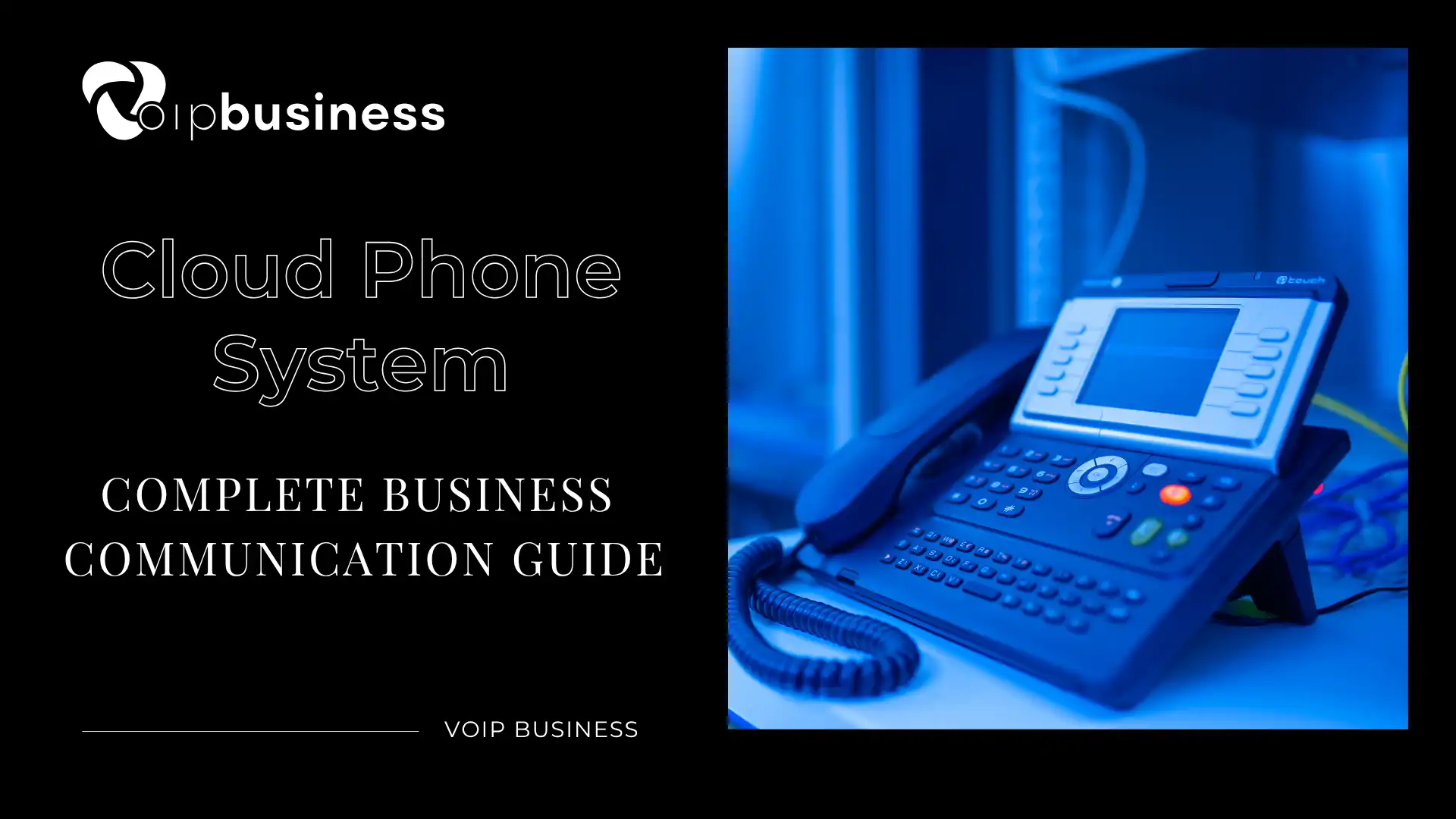To remain ahead of the competition and ensure consumers remain satisfied, businesses require a communication system that is efficient and easy to use. A cloud phone system is the best option that can be adopted by every business organisation, whether large or small. This is the reason why contemporary businesses are implementing the use of such technology.
The popularity of using cloud phones is attributed to the fact that the phones have facilitated easy access by businesses to their clients across the globe without necessarily undergoing a complex installation process at a particular location or installing software independently. Cloud calling enables business organizations to create an immediate local presence in various countries by ensuring they offer local phone numbers.
This is an informative blog on selecting a cloud phone systems in its entirety.
What is Cloud Phone System?
Hosted PBX (Private Branch Exchange) is also referred to as a cloud-based phone system, which is connected to the Internet to enable companies to redirect phone calls, store voicemail messages, and provide other telecommunication services. This online form of communication reduces expenses and enables modification and repair by a third party.
Your company does not require any telecommunication infrastructure; hence, it is extremely easy to install and offer it at your company. Hence, all you would have to do is purchase the cloud service that is offered by a vendor or its distribution partners and then you pay either a monthly subscription fee or an annual subscription fee. In essence, cloud phones are defined by such sophisticated features as extension dialing systems, auto attendants, distinct voice and video conferences, and ring groups, among others.
Moreover, VoIP (voice over internet protocol) is taking over the conventional business telephones when numerous individuals are remotely employed and spending time at home throughout the week but not operating on weekends or even during holidays.
Advantages of Cloud Phone Systems
The numerous business advantages are making cloud technology gain popularity. This kind of system can create interaction and connectivity among the employees by providing flexibility and work-from-home opportunities.
We shall examine some benefits that make the cloud phone systems a more prominent choice for businesses that are improving.
i. Reduce Expenses
Cost reduction assists firms in better utilize their finances. With the ability to save needless expenses and spend in a proper manner, companies can make more money, run effectively and grow without sacrificing quality.
ii. Better Reliability and Efficiency
Greater reliability and efficiency make all things run better and work better. Reliable systems contain fewer issues and since they are efficient, they get things done faster and more regularly.
iii. Quicker Implementation and Set-up
Quick setup refers to time-saving on preparation. This will prevent delays, the work will be completed more quickly and everything will run smoothly without creating any issues for your team.
iv. Reduced Maintenance Needs
Reduced maintenance needs imply reduced resources and time on maintenance. This efficiency saves on costs, minimises on disruptions and enables your team to concentrate on core activities resulting in increased productivity and reliability of the systems.
v. Get Access to Full Call Features.
The ability to have a full-fledged call feature or unlocked call features helps to engage in conversation and co-operation. By using cool features such as call routing, recording and checking call details, you can always stay connected to customers, work better and have better conversations with them.
vi. More Customer Satisfaction.
The customers who are satisfied are loyal and they will recommend others to your business. Businesses provide good experiences by providing excellent service and satisfying their customers, making them refer to them again and spread good word about them.
vii. Empowers Hybrid and Remote Workforce
Enabling the remote and hybrid teams work with ease enables them to be connected and still get things done despite their location. They are able to work effectively and remain productive with the right tools.
viii. Combined Communication Systems
Communication systems are integrated to simplify communication and collaboration among employees and enable them to talk and work together through email, messaging, and voice. This assists in making all people work more effectively, exchange information more readily, and maintain connectedness.
Advanced Features of Cloud phone systems
A PBX of public nature can perform better than a conventional PBX in the company premises, residential phones, and ordinary landline devices. The other characteristic is the flexibility of adding or deleting features in the hosted business telephony system and updating any new features when they are added. The other features of an advanced business phone system that make it the aforementioned IT solution include the following.
i. Unified Communications
Phone clouds offer one-stop solutions to unified communication, which integrates all types of communication on a platform. This involves instant messages, video conferencing, calls, voice mails, faxes, emails, CRM etc.
ii. International Calling
You can make a call anywhere in the world with the assistance of a cloud phone systems without attracting any additional costs. In the majority of cloud packages, calling is free and includes free international calls.
iii. Video Conferencing
Conference and video calling are useful in the context of remote work that is carried out by employees who desire to connect with their colleagues who are very distant or individuals in other places.
iv. Multiple Device Support
If you are not present physically in the office, a cloud phone can assist you in the form of support on other devices that share the same number.
v. Artificial Intelligence
With the integrated AI functionality, providers can also optimize cloud phones to make them avail more valuable customer services, speech-to-text conversion, and sentiment analysis.
vi. Blocklist and Allow List
The phone allows you to automatically block certain numbers and still get other calls even though you have the blocklist settings; this is a very good way of getting security.
vii. VoIP Features and High Definition
VoIP is an internet connection used to make a call between two parties thus it is much cheaper than traditional telephony. Get a telephone system that is internet-based and has numerous features such as high-quality audio in order to call well.
Provider for Cloud-Based Phone System
In selecting the preferred cloud-based VoIP business phone system, one must do a lot of research and compare his/her budget with the services and packages that the providers offer. This is necessary at this level, as service providers introduce various packages and features that are charged with varying prices.
Therefore, such analyses must be completed initially. Service quality is important and customer care service satisfaction among other service providers is also important.
In making your decision on whether you would like a virtual extension platform or a residential VoIP service, you should take into account the current situation and the business outlook of your business with the following factors:
- You need cloud phone systems that will have a set of functions including: auto-attendant, call forwarding, and call routing.
- In case your company requires branch exchange (PBX) or virtual telephony services.
- In case you need to see your colleagues every day via messaging or video conferencing.
- Select a system after being shown a preview of the onboarding process and assessing after sales technical support.
- Compare the best features you can afford.
Establishing a Cloud-Based Telephone System
After picking a phone based on the cloud, it does not take long before you can configure a cloud phone system to all kinds of businesses. You simply need to take two easy steps in order to install a full-fledged virtual phone system:
i. Choose a suitable number
In the case of your business, you would want to use either local or toll-free numbers. There can be different numbers in various departments. Local numbers are more relevant to small or medium businesses, since they make their customers feel closer to them. The toll-free numbers are more appropriate to businesses with a national or international scope since they assist in the establishment of a favorable brand image and the acquisition of new clients.
ii. Install the app
The cloud providers collaborate effectively with a web-based application or via the phone that centralises the control on your complete phone system. Once you enter the phone numbers, you then install the app on your gadget.
Subsequently, one can open an account and log in to the online portal to access the company network or any device.
iii. Apply the required settings
Cloud telephony systems have several customisable features such as auto attendants, call settings, music-on-hold or ringing groups, user-managed voice mailboxes, business lines with their working hours as well as a control panel.
iv. Test the system
One needs to put the cloud-based phone system to the test first to ensure that it is on your side to implement it. This includes making good calls and text messages, which work with the voicemail system, among others, and can assist in such acts.
Problems and Difficulties Facing Cloud Phone Systems
The telephony systems based in the clouds offer business connectivity, but they are limited to internet connectivity, susceptible to cybersecurity problems, lack of user scalability, complicated integration with the current systems and business software, as well as substandard quality of calls as a result of ineffective internet service in far-off places. These are the issues that have to be considered to have an effective cloud telephony.
Moreover, the problem of security is of paramount concern since it is not users of the infrastructure who become the victims of cyber-attacks and data breaches, but cloud-based systems that contain the information that requires high-level security in order to avoid such a threat. It may definitely be difficult when companies with complex or legacy systems will implement them into the current IT structure.
In Conclusion – Cloud Phone System
Cloud phone systems are based on the VoIP technology to place phone calls, messenger, greet voice messaging and manipulate communications. It is inexpensive, easy to scale, cannot run without maintenance, reliable mode of operation and intelligent. This is a multi-purpose tool that can be used by all companies. The telephony system provided by the leading CCAAS provider, TelcoDataCloud, is cloud-based, which can be fitted with special features, with the help of which the companies can manage to improve communication channels and efficiency.
Moreover, advanced business communication is not always necessary with the use of expensive hardware, as cloud-based telephone systems can be used; they save resources and time and improve workflow, thus increasing the productivity of an organization. Individuals who may not be convinced of such capabilities might give it a test run by a free version of the same.
FAQs – Cloud Phone System
Q1. What is a cloud phone system?
Cloud phone system is an innovative communication platform that uses the internet in making calls and is very flexible, cost saving and also provides more features than traditional phone systems.
Q2. What are the cost savings of cloud phone systems to businesses?
Cloud phone systems are also cost-effective to companies as they eliminate unnecessary hardware and maintenance expenses and offer flexible pricing options and international calls are usually free. This implies a great deal of saving both in equipments and in the communication costs.
Q3. What should be the key characteristics of a cloud phone system?
Choosing a cloud phone system, one should focus on the capabilities in VoIP, easy integration with business applications, support of mobile devices, the availability of effective call handling features, and high security. These are the main features that will make sure that the communication is efficient and also of course, protect your business.
Q4. What can companies do to guarantee quality of calls in cloud telephony?
To achieve high quality in the calling systems in the clouds, companies are advised to invest in high speed internet, use Quality of Service (QoS) features to prioritize voice traffic, and choose a well-known service provider characterized by unambiguous communications.
Q5. What should be the security provisions of cloud phone systems?
In order to guarantee security of cloud phone systems, apply the industry standards encryption, multi-factor authentication, regular security audit and effective data privacy measures. Such actions are essential in keeping off cyber-attacks and ensuring customer loyalty.
Q6. Does a cloud phone system fit my small business?
Absolutely! Cloud phone system is very adaptable and economical and thus a good option that may suit small businesses with the desire to improve their communication.
Q7. What is cloud PBX?
One of the phone systems is the cloud PBX system where equipment is hosted by the providers. It enables desk phones to be connected and utilize the network and the server takes care of signaling and call functionality.
Q8. What if my internet is lost? Is my cloud phone system going to work?
Cloud phones are fully reliant on the internet connection to receive and make calls. Nevertheless, there are also call-forwarding capabilities that call forward to an alternative number in case you lose your internet connection temporarily.
Read More : History of VoIP and Internet Telephony: From The 1920s To Present Day



